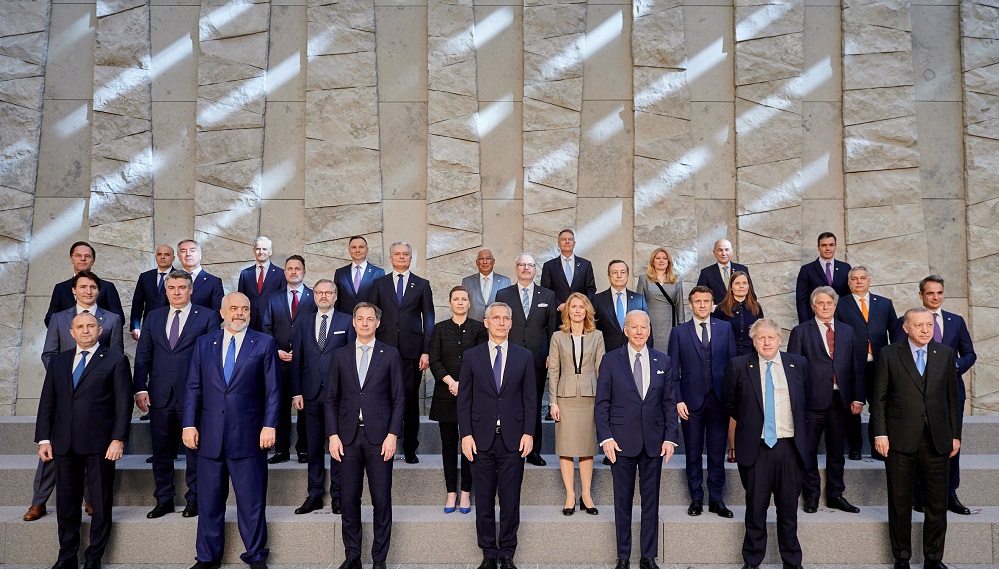Ukraine: NATO Avoids War With Russia, Calls On China To Support Sanctions
The Heads of State and Government of the 30 North Atlantic Treaty Organization Allies, including the United States and the United Kingdom, failed to approve the deployment of military troops into Ukraine on Thursday but outlined some tough measures against the Russian government.
In a statement issued after its emergency summit in Brussels, Belgium, the alliance also called out China and advise the Beijing administration not to help Russian government avoid the impact of sanctions imposed by the US and European countries.
Advertisement
“We call on all states, including the People’s Republic of China (PRC), to uphold the international order including the principles of sovereignty and territorial integrity, as enshrined in the UN Charter, to abstain from supporting Russia’s war effort in any way, and to refrain from any action that helps Russia circumvent sanctions.
“We are concerned by recent public comments by PRC officials and call on China to cease amplifying the Kremlin’s false narratives, in particular on the war and on NATO, and to promote a peaceful resolution to the conflict,” the statement partly read.
Recall that Ukraine’s neighbour, Poland had reportedly requested for military deployment into Ukraine.
Ukraine is not part of NATO but had requested for membership including into the European Union; Poland has strongly joined the call for its EU membership.
Advertisement
Poland is apparently feeling the impact of the Russia/Ukraine conflict because it is currently the biggest recipent of Ukrainian refugees, numbering about 2.1 million Ukrainians ( as of February 24) out of over 3.1 million that fled, according to the United Nations Office for the Coordination of Humanitarian Affairs.
Before the summit began on Thursday, the Polish President Andrzej Duda told newsmen that “We must stop the Russian aggression with the maximum possible peaceful means, but effectively and decisively.”
But according to the NATO statement, the alliance maintained that it will boost military presence in neigbouring European Countries while sustaining its financial, intelligence and military equipment support for Ukraine.
“Ukraine has a fundamental right to self-defence under the United Nations Charter. Since 2014, we have provided extensive support to Ukraine’s ability to exercise that right.
“We have trained Ukraine’s armed forces, strengthening their military capabilities and capacities and enhancing their resilience.
Advertisement
“NATO Allies have stepped up their support and will continue to provide further political and practical support to Ukraine as it continues to defend itself. NATO Allies will also continue to provide assistance in such areas as cybersecurity and protection against threats of a chemical, biological, radiological, and nuclear nature.
“NATO Allies also provide extensive humanitarian support and are hosting millions of refugees. Foreign Ministers will discuss further our support to Ukraine when they meet in April.
“In response to Russia’s actions, we have activated NATO’s defence plans, deployed elements of the NATO Response Force, and placed 40,000 troops on our eastern flank, along with significant air and naval assets, under direct NATO command supported by Allies’ national deployments.
“We are also establishing four additional multinational battlegroups in Bulgaria, Hungary, Romania, and Slovakia. We are taking all measures and decisions to ensure the security and defence of all Allies across all domains and with a 360-degree approach.
“Our measures remain preventive, proportionate, and non-escalatory. We will now accelerate NATO’s transformation for a more dangerous strategic reality, including through the adoption of the next Strategic Concept in Madrid. In light of the gravest threat to Euro-Atlantic security in decades, we will also significantly strengthen our longer term deterrence and defence posture and will further develop the full range of ready forces and capabilities necessary to maintain credible deterrence and defence. These steps will be supported by enhanced exercises with an increased focus on collective defence and interoperability,” it stated.
Furthermore, the alliance urged the Russian government to negotiate with Ukraine.
Advertisement
Th statement partly reads:
“Russia needs to show it is serious about negotiations by immediately implementing a ceasefire. We call on Russia to engage constructively in credible negotiations with Ukraine to achieve concrete results, starting with a sustainable ceasefire and moving towards a complete withdrawal of its troops from Ukrainian territory. Russia’s continuing aggression while discussions are taking place is deplorable. We support Ukraine’s efforts to achieve peace, and those undertaken diplomatically by Allies to weigh in on Russia to end the war and relieve human suffering.
“We stand in full solidarity with President Zelenskyy, the government of Ukraine, and with the brave Ukrainian citizens who are defending their homeland. We honour all those killed, injured, and displaced by Russia’s aggression, as well as their families. We reaffirm our unwavering support for the independence, sovereignty, and territorial integrity of Ukraine within its internationally recognized borders extending to its territorial waters.
“We condemn Russia’s invasion of Ukraine in the strongest possible terms. We call on President Putin to immediately stop this war and withdraw military forces from Ukraine, and call on Belarus to end its complicity, in line with the Aggression Against Ukraine Resolution adopted at the UN General Assembly of 2 March 2022. Russia should comply with the 16 March ruling by the UN International Court of Justice and immediately suspend military operations. Russia’s attack on Ukraine threatens global security. Its assault on international norms makes the world less safe. President Putin’s escalatory rhetoric is irresponsible and destabilizing.”



